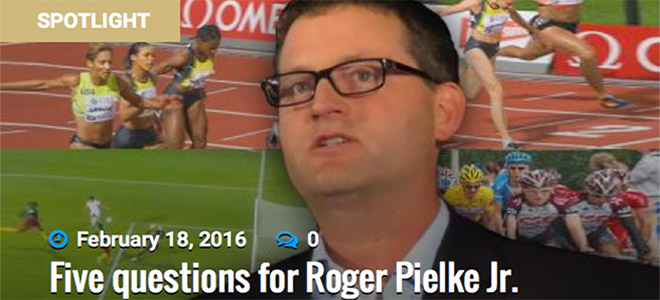CU Connections
February 18, 2016
Science professor discovers game changer in frontier of sports governance
You might know Roger Pielke Jr. as a University of Colorado Boulder environmental studies professor, Fellow of the Cooperative Institute for Research in Environmental Sciences (CIRES) and the founder of the CIRES Center for Science and Technology Policy Research. But in recent years, Pielke has begun to focus more of his research on another often-discussed topic: sports and policy. And now he has proposed instituting a new center on campus, the Center for Sports Governance.
The idea for the center has percolated over the past few years.
“At some point in my (policy) teaching, I started using examples from the world of sports, in particular the issue of sex testing in the Olympics and how it is determined who is eligible to compete in the women’s events, which has been interesting and complicated and a fraught political topic for about a half-century,” Pielke said. “I also used the issue of Oscar Pistorius, who runs on blades, as an example of what is called technological augmentation and how athletes make their bodies better or stronger. The question is, how do you come up with rules for that?
“The students were really into it. They liked the sports examples. Sometimes when you talk about governance and policy, unless that is your thing, it can be kind of dry, but sports really made it come alive.”
From there, the topic of sports governance became something of a hobby for Pielke, and then it grew to occupy some of his professional time. Later, he decided to jump in with both feet.
Pielke earned three degrees at CU-Boulder in the late ’80s and early ’90s. He went on to work as a scientist for the National Center for Atmospheric Research before being recruited to CU, where he was asked to found a center focused on science and technology policy in 2001.
His father was one of the first atmospheric scientists to conduct three-dimensional modeling of the atmosphere.
“When I was a child, I learned how to program computers in FORTRAN. I thought every kid learned how to do that. When I got to college, I realized I had that kind of a skill so I landed a job at NCAR as an undergraduate as a computer programmer,” he said.
At NCAR he rubbed shoulders with brilliant scientists.
“This was when ozone depletion was a big issue, and I remember the scientists would sit around and say things like, ‘If only politicians better understood science, the world would be a much better place.’ And I thought maybe I should know something about this political world if I was going to have a career in science.”
During his mater’s work in public policy at CU, he was advised by Rad Byerly (who passed away two weeks ago), who was invited to go to Washington, D.C., to be the chief of staff for the House Science Committee. Pielke said Byerly “must have felt bad leaving me behind” and so he brought Pielke with him to the Hill.
“The a-ha moment came to me one day when the senior staff was sitting around, critiquing a Nobel Prize-winning scientist who was asking for more money for science. They said, ‘If only these scientists better understood Washington, the world would be a much better space.’
“I realized that both sides thought the other needed to understand more about the other. That’s when I decided to get a Ph.D. in political science focused on policy for science and technology.” Read more …


